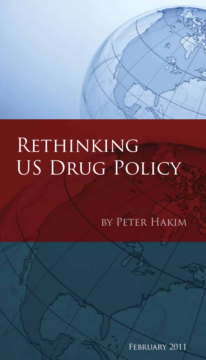The VI Summit of the Americas could spark a more serious and mature debate on drug policy, said John Walsh, Senior Associate for drug policy at the Washington Office on Latin America (WOLA). On April 10, the Inter-American Dialogue and WOLA held a roundtable on drug policy and the Summit of the Americas with Walsh, Alejandro Hope, Ethan Nadelmann, director of the policy advocacy group, Drug Policy Alliance, and University of Maryland Professor Peter Reuter.
The Panelists commented on what sets apart the Cartagena meeting from previous Summits. Nadelmann acknowledged that the current ideas “are not new,” but that the region often engages in debate without taking action. However, he sees recent policy shifts in the region as a sign that the Summit discussions may have more impact. Reuter agreed that Latin America, seen internationally as a victim of the current US and international drug regimes, has gained a “moral voice” on the drug issue.
Through cooperation with the European Union, Latin American leaders could help to open up the space to experiment with new policies and, eventually, reform the international drug regime. Walsh stressed that regulatory experimentation within different countries and even at a sub-national level is necessary to find the best policy balance to address the full range of psycoactive drugs.
Reuter noted that, in the past, the norm was to see how “Latin America can help the US”. In this case, the reverse is true – Latin America is asking how the US can help them, which puts pressures on Washington to acquire new drug policies. According to Nadelmann, the upcoming Summit will be the first major gathering of leaders in which alternative drug policies will be discussed. And for the first time, these regional leaders have the public support backing them. For Nadlemann, the fact that the US acknowledged the validity of this debate at all is a crucial shift that may give governments in the region room to experiment with different drug regulation schemes.
As for expectations, Walsh does not anticipate any massive changes in Cartagena, but the fact that the topic is in the agenda means that the “debate cannot longer be ignored”. Nadelmann expects “lively discussion” in the closed door meeting, but that the public stance of leaders will not change. Nonetheless, he is hopeful that regional leaders commit to searching for alternative drug policies.
The panelists offered their visions for what the Summit conversation might produce. Hope and Reuter argued that regional leaders should shift the focus and expectations for law enforcement. Governments should shift their immediate focus on mitigating drug market violence by targeting the most violent criminal organizations, Hope argued. Reuter proposed that governments use enforcement more strategically to move trafficking routes to the areas where they will do the least harm.
Walsh agreed that enforcement will continue to play a role in drug policy, but argued that it should shift from combat towards regulation. Nadelmann called for three major changes to be discussed in Cartagena: the decriminalization of possession of all illicit drugs, with Portugal as the example, the legalization of marijuana, especially the role of the American society and States as they take steps towards legalization, and the exploration of alternative policies towards hard drugs (such as cocaine) as they are not in the legalization agenda.




















